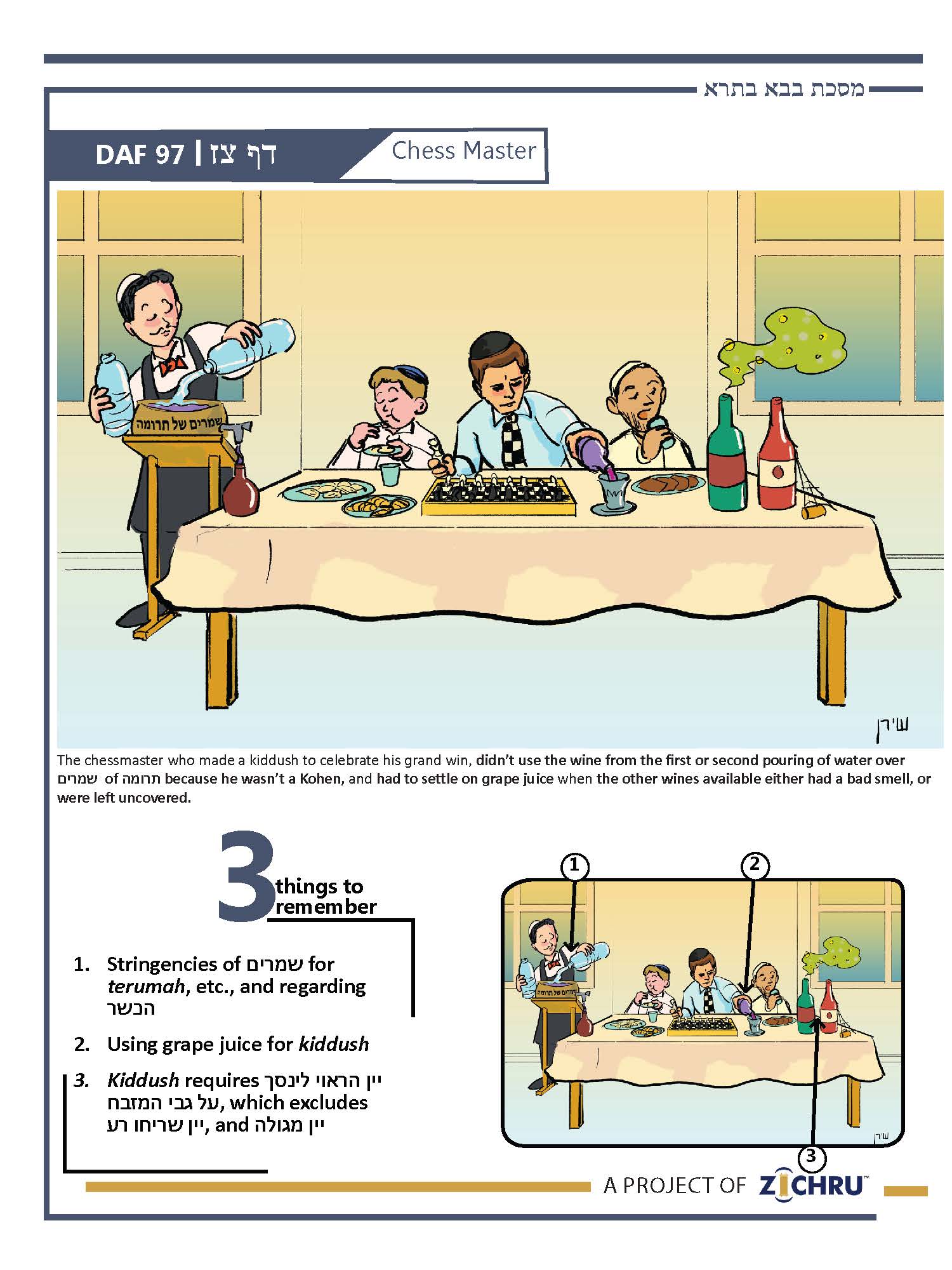Bava Basra - Daf 97
- Audio Timestamps
0:00 - The 3 Sugyos
2:03 - Review of 3 Sugyos
4:00 - Siman
4:57 - 4 Blatt Back Chazarah
- For access to all Zichru resources including PDFs, and illustrations CLICK HERE
- Stringencies ofשמרים for terumah, etc., and regarding הכשר
A Baraisa teaches regarding “wine” produced by שמרים of terumah, that the first and second pourings are prohibited to a non-Kohen, but the third is permitted. Although the same amount of liquid that was poured in emerged, the Rabbis were stringent regarding terumah. The Baraisa lists the levels of stringencies enacted for maaser and hekdesh, and the Gemara addresses apparent contradictions from another Baraisa. Rebbe Shimon ben Yehotzadak said: כדרך שאמרו לענין איסורן – the same rules which they said regarding prohibitions, כך אמרו לענין הכשירן – they also said regarding making food susceptible to tumah (i.e., such “wine” of terumah is considered wine for two pourings, but water thereafter). The Gemara asks that since both wine and water are מכשיר foods for tumah, what difference is there whether the liquid is considered wine? Even if rain fell on its own into the container with the שמרים, as soon as the owner pours out the drink, he shows his pleasure with the rainwater, and the third rainfall would beמכשיר food even it is water!? Rav Pappa concludes: בפרה ששותה ראשון ראשון – the case is where a cow drank the liquid from the rainfalls one by one. Thus, a third rainfall was reached without the owner demonstrating his pleasure, and the drink would only be מכשיר if it is considered wine, which is מכשיר without his consent.
- Using grape juice for kiddush
Rav said: אין אומרים קידוש היום – One may not recite kiddush of [Shabbos] אלא על היין הראוי לינסך על גבי המזבח – except on wine which is fit to be poured on the mizbeiach for נסכים. The Gemara wonders what type of wine he means to exclude. He cannot mean to exclude יין מגתו – wine straight from the press (i.e., grape juice which has not yet fermented), because Rebbe Chiya taught in a Baraisa that although wine straight from the press may not be used for נסכים, still, אם הביא כשר – if he brought it, it is valid (as נסכים). Since it is valid for נסכים after the fact, it may be used for kiddush even לכתחילה (since its requirements are more lenient), and Rava explicitly said: סוחט אדם אשכול של ענבים – a person may squeeze a cluster of grapes, ואומר עליו קידוש היום – and recite kiddush of [Shabbos] on it!?
The Gemara continues to seek the type of wine which Rav disqualified.
- Kiddush requires יין הראוי לינסך על גבי המזבח, which excludes יין שריחו רע, and יין מגולה
Rav said above: אין אומרים קידוש היום – One may not recite kiddush of [Shabbos] אלא על היין הראוי לינסך על גבי המזבח – except on wine which is fit to be poured on the mizbeiach for נסכים. After the Gemara rejects numerous possibilities for what type of wine Rav disqualifies, the Gemara concludes with two answers: (1) שריחו רע – wine which has a foul odor, which is invalid for נסכיםeven בדיעבד, as taught in a Baraisa. (2) Alternatively, he is disqualifying מגולה – wine which was left uncovered. Although the Gemara earlier had objected that such wine is dangerous to drink at all times, the case is דעברי' במסננת – he passed it through a strainer, which removes the danger of snake venom (according to Rebbe Nechemiah). Although it is permitted to drink, it is still disqualified for נסכים or kiddush, because the passuk says about using a lame or sick animal as a korban: הקריבהו נא לפחתך – Offer it, if you please, to your governor, הירצך או הישא פניך – will he be pleased with you, or will he show you favor?
Siman – Chess Master
The chessmaster who made a kiddush to celebrate his grand win, didn’t use the wine from the first or second pouring of water over שמרים of תרומה because he wasn’t a Kohen, and had to settle on grape juice when the other wines available either had a bad smell, or were left uncovered.


